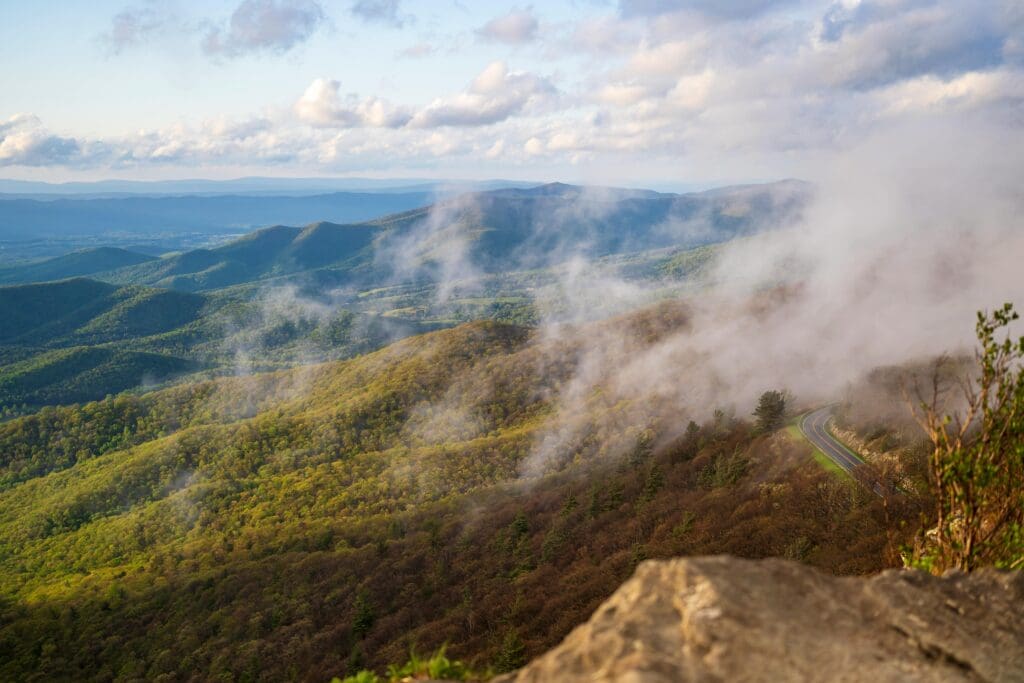By Heather Vaughan, WNC Resident
We’d like to shine some special light on longtime FreshPure® hub and one of our favorite places in the country: Asheville and all of Western North Carolina and the Hurricane Helene, the largest natural disaster since Hurricane Katrina, swept through the region with Asheville as its epicenter on September 27th, 2024. The storm began in Florida and moved up through Georgia and South Carolina, who also experienced power outages, flooding, and damage. Recovery in those areas, however, has been more efficient than in this steep mountain terrain. Watching Western North Carolina (WNC) brilliantly survive and begin the process of recovery caught our attention for a specific reason: you guessed it – water.
This New Year’s we want to honor the region’s plight and resilience, share ways to support WNC’s heroic and ongoing recovery, and some hacks learned from the direct experience of living without access to clean water for an extended period of time.
Hurricane Helene
The beautiful Blue Ridge Mountains, abundant in stunning rivers, waterfalls, and forest-covered peaks that seem to extend endlessly into the distance captivate residents and visitors alike. This majestic terrain also set the stage for extraordinary damage. “Helene’s impacts – particularly flooding and landslides – have made it one of the deadliest US storms of the 21st century, with more than 100 confirmed deaths in North Carolina alone” (OSBM).
In a mere five hours, massive rainfall and high winds produced a series of tornadoes, created storms within storms, and caused over 2000 mudslides, destroying “thousands of homes and damag(ing) tens of thousands more,” (OSBM). Thirty-nine counties were affected, with the greatest damage sustained in Buncombe, Yancey, Mitchel, McDowell, and Avery counties.
Forty percent of trees were ripped down in Buncombe County alone. Asheville’s famed Biltmore Village and River Arts District, downtown Swannanoa, Montreat, Busick, Chimney Rock, Burnsville, Marshall, Hot Springs, Bat Cave, Lake Lure, and other small towns have been stripped to rubble. Widespread power outages due to the vast number of trees that came down on powerlines and blocking roads meant access and communication was extremely limited. For several days, there was no route in or out of the region. The subsequent run on supplies at the few stores and gas stations who remained open reoriented the region’s residents to the potential for disasters at any moment in the most tangible way.
Creativity, Community, Resilience: The Essence of Asheville
With communications and infrastructure demolished to such a dramatic degree, simply waiting for help to come was not an option. People in the mountains are hearty and resourceful. One gentleman we’ll call Matthew, caught on the road during the storm, waited it out at a gas station. When the rain stopped, he simply pulled his chain saw out of his truck and started sawing through trees, clearing his way home. Others stranded were able to follow in his path.
Restaurants cooked all their remaining food and gave it away for free. Supplies and support poured in from FEMA, non-profit organizations, churches, and generous individuals. Distribution centers popped up all over the region. Gyms and community centers with water and generators opened up their showers to anyone who needed one and offered internet access so folks could apply for aid and check in with loved ones (a special thank you to the YMCA!).
Shelters sprang up at churches, gyms, and hotels. Folks showed up for their neighbors left and right. After a week without power, freezers melted and food went bad, causing a whole new kind of flood. So, a South Asheville women began cleaning out her neighbors’ freezers and offered her service to anyone incapable of carrying out the task themself. She even gave out her phone number live on the radio. She’d come by equipped with a bucket, rubber gloves, and bleach, and take care of it.
The mountain community truly came together in an amazing display of what becomes possible under the intense pressure of need.
Let’s Talk About Water.
In our modern world we take water for granted as an expected part of life. Turn on the tap, water runs clear. Local treatment facilities carry out the important task of making sure water provided by the municipality adheres to State and EPA standards. Manufacturing factories were destroyed, contaminating rivers to further complicate matters, and the entire water treatment facilities of several counties were badly damaged. Post Hurricane Helene, the City of Asheville and hardest hit towns went without running water for nearly a month and without potable (drinkable) water for 53 days.
What does that mean, exactly? How does that change daily life?
Drinking Water
Naturally, drinking water is the most immediate problem to solve. This can be remedied by making sure you have a solid quantity of purified water on hand, as well as a good home filter and large stock pot for boiling as back up.
Hygiene
When it came to flushing the toilet, residents got creative. Lucky locals had streams running through their backyard or neighborhood. So, they filled buckets, carried them home (which often involved hills or stairs… or both) and flushed by pouring water down the toilet manually. For some, this was inconvenient and tiring, for others, impossible.
One several story walk-up apartment’s elderly residents were simply unable to carry heavy water up the stairs. So, their neighbors stepped in. Large cubes marked potable and non-potable water appeared on the curb. The crew carried hundreds of gallons of water up the stairs, making sure all residents could flush their toilets and wash their dishes.
Bathing is another issue to contend with, and tougher than flushing the toilet. Many became effective “bucket bathers.” Mobile showers and laundry facilities popped up in parking lots, thanks to outside assistance.
Water Specific Disaster Necessities
The frequency and strength of natural disasters are increasing at a rapid clip. We recommend keeping some key items on hand.
- Always store 1 gallon per person per day of potable water. We recommend having at least 10 days of water on hand at all times.
- 5-gallon Sports cooler with a spout. Set this up next to your sink and use minimal water when washing dishes to conserve.
- Water filter as back up.
- Large stock pot for boiling.
- When you hear of a storm warning, fill the bathtub, buckets, and pots right away. You’ll be able to use this water to flush the toilet if there’s an outage.
For more on Water in an Emergency, please visit this article.
How to Support Asheville & WNC’s Continued Recovery
WNC received media coverage and an outpouring of support for the first few weeks immediately following the storm. But now, the event has passed out of the news cycle and general awareness. Shocking news brings immediate support. It’s months later, however, that the longer, lonelier part of the struggle sets in. Here are some ways you can support the region’s continued recovery from near and far.
- BeLoved Asheville, trusted beacon of support since 2009, continues to work hard for displaced and disenfranchised WNC residents.
“Backed by your support, BeLoved Asheville is dedicating every resource to those most affected by this disaster. Our immediate focus has been on critical necessities like food, water, and healthcare for survival and stability. As winter looms, we are securing warm and safe housing for the displaced. Looking further ahead, recovery from the vast destruction will be a large-scale investment over several years. We believe that we can unite to rebuild a community that embodies home, health, equity, and opportunity for all.”
- Visit consciously. A well-known tourist destination, Asheville needs visitors to return. While many businesses were lost to immediate flooding and damage, many more have closed their doors due to lost income – Helene hit at the beginning of Fall, WNC’s busiest tourism season. Now, as we head into the region’s historically slow season, many more will not make it through to the Spring without you. Conde Nest Travel highlights some of the hotels, restaurants, and businesses that have reopened and would love to see you.
- The City of Asheville offers an extremely thorough list of updates and resources available to residents, ways to volunteer, and places to donate here.
Water, Our Most Precious Resource
We hope the world understands what Water Day 0 really means. WNC certainly does. Be prepared, conserve in drought-ridden areas and do your best to live your life in a way that is as easy on the planet as possible.
FreshPure® Waters is proud to have bulk water dispensers in the Asheville area at:
- Earth Fare in West Asheville
- Whole Foods Markets on Merrimon and Tunnel Roads in Asheville and on Hendersonville Road in Arden
- Hendersonville Community Co-op in Hendersonville
- The Fresh Markets on both Merrimon and Hendersonville Roads in Asheville
- Ecusta Market & Café, on Lenno Park Drive, in Hendersonville

